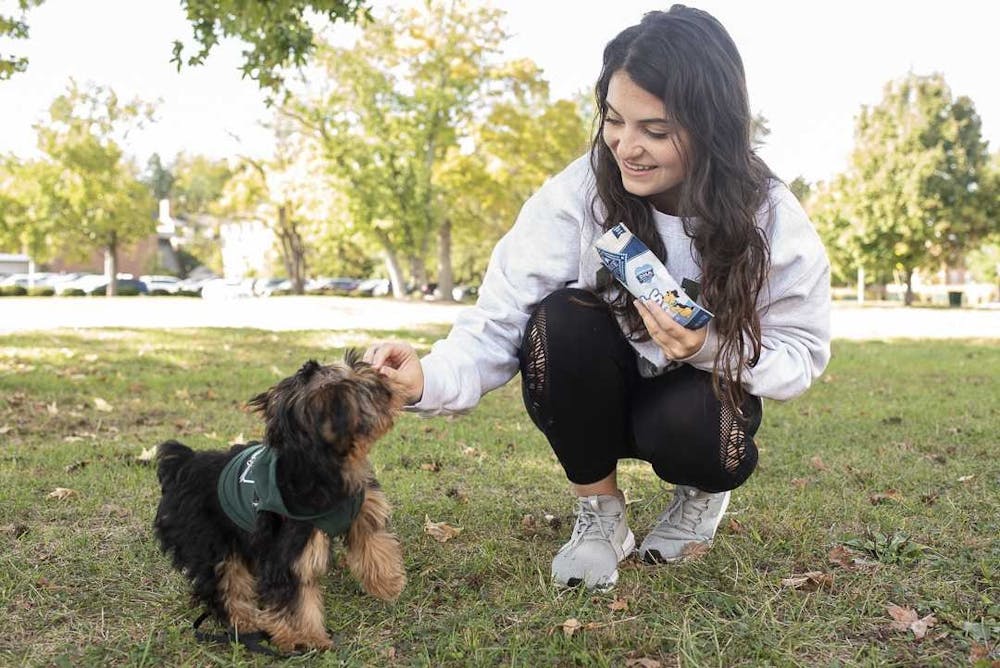Statistics show that female students on Ohio University’s campus are more likely to own emotional support animals than male students as the amount of companion animals on campus increases.
Jneanne Hacker, director of Business Operations and Conference Services, said 93% of students requesting assistance animals are female while only 7% are male. However, Hacker said that information does not take personal gender identity into account.
“I also want to emphasize that OHIO provides allowances for assistance animals which can be different from companion animals, which are typically pets that are permissive without a documented disability,” she said in an email.
Christy Jenkins, associate director for Student Accessibility Services, said service animals and assistance animals have different rules and responsibilities.
“Service animals are trained to perform a specific task for the student with a disability and has the right to public access, while other assistance animals are to be contained within the individual student’s residential placement,” Jenkins said in an email.
She also said students must have a disability and proper documentation to have any kind of animal on campus.
Supporting the statistics, students with companion animals also agreed that females are the ones who are more likely to have them.
“It's the same level of difficulty for both genders to have ESA animals but it is more likely for females to have them due to the stereotype of men pushing off mental health issues,” Zach Glomb, a sophomore studying mechanical engineering, said.
Glomb has a 4-month-old Siberian Husky named Ghost. Glomb said the type of person to own an emotional support animal doesn’t have to fall into a certain category, and anyone who needs it should have one.
“The students that are most likely to have them are students that have mental health issues,” he said. “This means that most of the time the people with these animals will be completely different from one another and can’t be put into a ‘type’ because you don’t really know who has these issues unless you know the person.”
Hailey Dobbs, a freshman studying entrepreneurship, said the stigma of mental health and gender also applies to who owns emotional support and companion animals.
“I think it’s easier for females to have emotional support animals because they might be more willing to handle the responsibilities, however, both are able to have the need and be approved,” Dobbs said. “I think girls are more likely to have them because is socially more acceptable for females to have emotions.”
Dobbs owns a 5-year-old boxer-hound mix named Morgan. She said the type of activities someone is involved in can affect their ability to own an emotional support animal.
“I think students who are involved in clubs, more laid back and responsible are more likely to have emotional support animals,” she said. “I think they want to share their pets with other people and keep their pets sociable. They also have to have time to take care of the pet. Dogs need exercise, cats need litter boxes changed. They can’t always go to parties or stay out. They need to be with their pets.”
Both students also agreed that other challenges include living on-campus with roommates when taking care of an emotional support animal. Dobbs said while roommates have to sign-off on having an animal in the room, the do not have the responsibility of taking care of them.
“That makes it tough, because you want someone who will take care of the animal if you’re not home,” she said. “For example, if you have multiple classes in a row and they don’t, they could feed the animal or take it outside if it’s a dog, but they don’t have to. You want to find people who work with you and the animal.”
Glomb said living with others can also become more difficult when training the animal.
“Discipline for the animal can be difficult when there are more than one person interacting with the dog at these times,” he said. “Also roommates have to be okay with any accidents the animal has whether that be bathroom or destruction because these are inevitable at some point.”
Nevertheless, this hasn’t discouraged OU students from adopting emotional support animals and taking care of their mental health.
“I think the number of companion animals has increased because mental health is becoming more of a social norm, and people aren’t afraid to speak up,” Dobbs said. “I also think the opportunity is becoming more apparent to people rather than before, they didn’t know it was an option.”
Jenkins said cases regarding emotional support animals have also become more visible in the media.
“As students see others with animals on campus, they may become attuned to the possibility and seek out the accommodations for themselves,” Jenkins said in an email. “Overall, society is making strides toward reducing the stigma of mental health, which has likely resulted in more individuals being more open about their experiences.”






